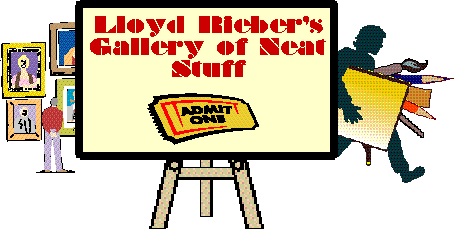
![]() Lloyd's Collection of Exemplary UGA Student Projects
Lloyd's Collection of Exemplary UGA Student Projects
Interactive Stuff
Nowhere Road - The Game - Well, of course I have to showcase my web site's "calling card" activity at the top of the list! Join me on my daily commute by bicycle from my home on Nowhere Road to my office at the University of Georgia. Bring plenty of water and dog repellant and watch out for those cars. And remember: no helmet, no brains.
This Thing Called Interactivity - We all like using the term, but few of us take the time to consider the richness and complexity of this thing called interactivity. (Credit for the idea behind this activity belongs to Carolyn Kletnicks, Gary Whitt, & Judith Hall of Virginia Tech.)
A Little Game to Demonstrate the Power of Representation - One of my favorite activities to demonstrate the power of representation. Sometimes, finding the right representation makes the learning of a fact, concept, principle, or procedure truly "child's play". SimSchool - Are you an objectivist, a constructivist, or some other philosophical beast altogether? Who cares? Would schools be any different if a true paradigm shift occurred tonight while we sleep? This is a very modest working model of Lloyd's understanding of these philosophical questions and their implication in education. (If you disagree with him, that OK -- confronting your own philosophical beliefs about learning, knowledge, and meaning in the context of education, then taking a stand, is the whole point of the exercise!) Need to make a presentation on this topic in your class and want to keep everyone awake (for a change), then feel free to use this simulation.
What is really true? A lesson in understanding constructivism - Here is little "lesson" that integrates SimSchool. Why is "lesson" in quotes? Read it and find out.The Chaos Game - No, this is not a simulation of my teaching ability! Instead, explore the world of fractal geometry to better understand how underlying order lurks behind apparent randomness. This is also one of my most favorite examples demonstrating how the powerful partnership between people and computers can extend human cognition. The science of chaos and complex systems would not be possible without this partnership. This example is always a crowd pleaser in instructional technology classes. Space Shuttle Commander - Learn about Newton's laws of motion by becoming the commander of the Space Shuttle! This is just a little demonstration version of a set of simulations and tutorials originally designed on the Apple IIe.
A Lesson on Understanding Newton's Laws of Motion - A short lesson on Newton's laws of motion that integrates the Space Shuttle Commander simulation.Mineshaft - Hone your estimation skills using whole numbers (positive and negative) and decimals by competing against your opponent to retrieve an old miner's pick from the mine. One of my most successful games (based on another version that taught estimation of fractions designed for the Apple IIe 'thousands' of years ago). The Rogue Refrigerator - An Acceleration & Velocity Simulation - How did these two guys find themselves in this predicament? Learn about some physics concepts and principles as you witness their dilemma. MMModel - MultiMedia Model of Cognition. The work of Alan Paivio, Richard Mayer, and myself (I'm the only stooge in the threesome) come together in a working model of cognition influenced by multimedia instruction. Korte's Law- An interactive demonstration of a classic experiment illustrating how the illusion of animation is made possible. Super Hero - Power Rangers meet Darth Vader (with my heartfelt apologies to George Lucas - but, hey, my son Thomas likes it). I designed this game to help Thomas understand what a game is about, using some of his favorite characters from "fine literature". Thomas was born with pervasive developmental disorder and he almost seems to be missing the "game chip" in his brain. It just goes to show how sophisticated game play can be, despite the fact that we so-called "normals" usually take it for granted. Shape Art - Show your creative side while learning about shapes and "parts-to-whole" strategies. I also designed this little activity for my son. It's best feature is the "clean-up" button. (Why can't I buy a house with this feature?)
Animations
A Walk Through the Forest to Understand Constructivism - Still confused about constructivism and it's implications in education? Viewing this little animation may help. Remember, life is a journey, not a destination. Examine whether this view is consistent or counter with the "gospel of ISD". What is Really True? A Challenge to Your Beliefs about Knowledge- Yet another little animation to help folks understand some of the fundamental principles of constructivism. Some think the goal of education is to teach people what we know about the world. Well, how can we trust what we know? Is our information correct? This animation gives you a new perspective (both literally and figuratively) on how easy it is to challenge even our most obvious "facts". And remember, information does not become knowledge just by its telling.